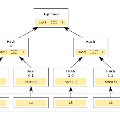Zero-Knowledge Proofs (ZKPs) are critical for privacy-preserving techniques and verifiable computation. Many ZKP protocols rely on key kernels such as the SumCheck protocol and Merkle Tree commitments to enable their key security properties. These kernels exhibit balanced binary tree computational patterns, which enable efficient hardware acceleration. Although prior work has investigated accelerating these kernels as part of an overarching ZKP protocol, exploiting this common tree pattern remains relatively underexplored. We conduct a systematic evaluation of these tree-based workloads under different traversal strategies, analyzing performance on multi-threaded CPUs and the Multifunction Tree Unit (MTU) hardware accelerator. We introduce a hardware-friendly Hybrid Traversal for binary tree that improves parallelism and scalability while significantly reducing memory traffic on hardware. Our results show that MTU achieves up to $1478\times$ speedup over CPU at DDR-level bandwidth and that our hybrid traversal outperforms breadth-first search by up to $3\times$. These findings offer practical guidance for designing efficient hardware accelerators for ZKP workloads with binary tree structures.
翻译:暂无翻译


